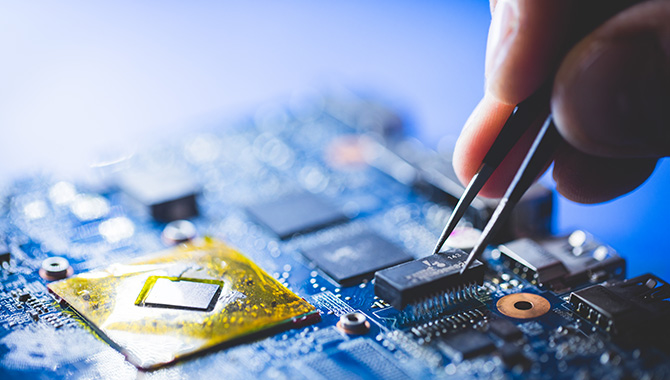The Master programs offer advanced specialization in cutting-edge fields of electronic engineering and related disciplines. Delivered entirely in English, these programs combine research-oriented learning with practical applications, preparing graduates for leadership roles in industry, research institutions, and international projects.
A prerequisite for studies at the second level (Master of Sciences Degree) is possession of a first-level degree —Bachelor of Sciences Degree (240 ECTS) in the field of electrical and computer engineering.
Level and type of studies
Master Academic Studies
Academic degree
Master in Electrical Engineering and Computing
Educational field
Technical-Technological Science
Duration (years/semesters)
1 / 2
Total ECTS
60
Tuition fee per year
4000 EUR
Application fee
100 EUR
A prerequisite for studies at the second level (Master of Sciences Degree) is possession of a first-level degree —Bachelor of Sciences Degree (240 ECTS) in the field of electrical and computer engineering.
Level and type of studies
Master Academic Studies
Academic degree
Master in Electrical Engineering and Computing
Educational field
Technical-Technological Science
Duration (years/semesters)
1 / 2
Total ECTS
60
Tuition fee per year
4000 EUR
Application fee
100 EUR
Study Programmes
On Master Academic Studies there are five study programmes:

Electrical Power Engineering
The overall goals of this study programme include education of master engineers competent for the development, design, and maintenance of complex systems and system parts in the field of production, transmission, distribution and use of electric power, as well as obtaining knowledge for further education at doctoral studies.
Namely, contemporary electric power engineering requires engineers to possess knowledge necessary for design, construction and maintenance of facilities on the present day development level, as well as the knowledge of how to apply new technologies and current trends in electrical power engineering.
More details Namely, contemporary electric power engineering requires engineers to possess knowledge necessary for design, construction and maintenance of facilities on the present day development level, as well as the knowledge of how to apply new technologies and current trends in electrical power engineering.

Computing and Informatics
The goal of the Study Programme Computing Science and Informatics of Master Academic Studies at the Faculty of Electronic Engineering in Niš is education of future engineers, competent for analysis, development, design, safety and maintenance of complex computer systems, ready to lead and participate in software projects, or deal with scientific work. Thus educated professionals should be able to quickly fit in the team work, present their results to the professional, scientific and wider public, as well as to be prepared for permanent education and advancement. The additional goal of the study programme is to ensure knowledge, necessary for following the latest scientific achievements and quick technological development in the fields of Computing Science and Informatics. Apart from the overall objectives of the Study Programme Computing Science and Informatics, each of the modules has its own specific goals, characteristic for narrow specialized fields.
More details 
Electronics and Microsystems
The goal of this study programme is to educate graduate engineers, competent to design, manufacture and maintain electronic components, circuits, devices, and systems. In that, care is taken that students extend the acquired fundamental and applicative knowledge, in order to be able to easily take part in the production process and/or doctoral studies. At the same time, an equally relevant goal of the Study Programme is also the development of creative way of thinking and accepting new knowledge, capacities for team work, skills in using measuring instruments and modern software tools, as well as the skills of expressing and presenting ideas and professional results obtained.
More details 
Communications and Information Technologies
The overall objectives outlined in this study programme include education of master engineers, highly competent for the development and design of complex communication-information systems, who possess all necessary knowledge and skills for further schooling in doctoral studies and for following rapid technological development in the field of communications and information technologies.
Profiles of engineers demanded by modern communications today imply those who possess knowledge for development, design, and maintenance of communication and information systems and devices on the up-to-date development level, as well as who will be able to understand and apply new technologies and modern trends in telecommunications.
More details Profiles of engineers demanded by modern communications today imply those who possess knowledge for development, design, and maintenance of communication and information systems and devices on the up-to-date development level, as well as who will be able to understand and apply new technologies and modern trends in telecommunications.

Control Systems
The goals of the Study Program Control Systems are practical upgrading in application of computers, microprocessors, microcontrollers, programmable logic controllers, robots and manipulators, measuring instruments and acquisition devices. The goal is also to qualify students for design and realization of control systems with artificial intelligence and specialized embedded computer systems, as well as gaining knowledge in the field of complex processes control by means of computer systems, and electrical power control systems. Students learn about modern methods of measuring electrical and non-electrical values, the needs for measurements and required accuracy in industry, electro-medicine and ecology.
More details 


